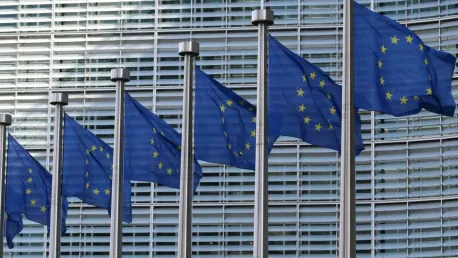The European Union has embarked on a significant journey to bolster transparency in corporate sustainability reporting through the Corporate Sustainability Reporting Directive (CSRD). This directive expands the reach of its predecessor, the Non-Financial Reporting Directive (NFRD), by mandating detailed disclosures for over 50,000 companies, compared to the previous 12,000. Slated to take effect in early 2024, the directive requires large companies to report on various sustainability metrics, with first reports due in 2025. Despite a clear compliance deadline, 17 EU member states have fallen behind in integrating this directive into national legislation, prompting the European Commission to take stringent enforcement measures.
The Scope and Importance of CSRD
Expanding Corporate Accountability
The CSRD represents a paradigm shift in corporate reporting within the EU, widening the scope to encompass over 50,000 companies. This expansion aims to create a more comprehensive and standardized framework for sustainability disclosures, ensuring that businesses of significant economic impact provide transparent and comparable data on their environmental and social activities. By doing so, the directive seeks to level the playing field across different industries, fostering a culture of corporate accountability that extends beyond financial performance. This change means that even more companies will be required to diligently track and report their sustainability efforts, thereby contributing to a significant increase in transparency and uniformity across the board.
In previous years, under the NFRD, only a select number of companies were obligated to disclose non-financial information, leaving a substantial gap in the data available to stakeholders. With the adoption of the CSRD, this gap is poised to close as more companies fall under the regulatory umbrella. This pivotal shift not only places greater responsibility on businesses but also offers investors, policymakers, and consumers a clearer picture of corporate sustainability practices. The extension of mandatory reporting to a wider range of entities underscores the EU’s commitment to integrating sustainability into the core of business operations, paving the way for a more resilient and responsible economic landscape.
Key Reporting Requirements
Under the new directive, companies must disclose their environmental footprint, adherence to human rights, social standards, and identify sustainability-related risks. These requirements are designed to provide stakeholders, including investors and consumers, with deeper insights into corporate practices, aiding in more informed decision-making processes. Disclosures encompass a broad array of environmental metrics, such as carbon emissions, water usage, and waste management practices, which can significantly influence public perception and investor sentiment. Beyond environmental aspects, the directive also mandates reporting on social parameters, ensuring companies are held accountable for their impact on employees, communities, and broader societal factors.
The authenticity and thoroughness of these reports are crucial, as they form the basis for evaluating corporate performance against sustainability benchmarks. Companies are encouraged to adopt standardized reporting frameworks, such as the Global Reporting Initiative (GRI) or the Task Force on Climate-related Financial Disclosures (TCFD), to maintain consistency and comparability across different sectors. This structured approach not only benefits the companies by providing a clear blueprint for compliance but also enhances stakeholders’ ability to assess and compare sustainability performance accurately. In essence, the CSRD’s stringent reporting requirements aim to elevate corporate transparency and drive a higher standard of sustainability across the European Union.
Enforcement Measures by the European Commission
Initiating Infringement Procedures
The European Commission has demonstrated its commitment to the CSRD by initiating infringement procedures against 17 member states, among them Belgium, Germany, Spain, and the Netherlands, for failing to transpose the directive into national law by the July 6, 2024, deadline. This enforcement action underscores the Commission’s resolve to maintain uniformity and ensure that no member state lags in implementing the directive. By taking such decisive steps, the European Commission aims to address the disparities in national legislations that could undermine the directive’s efficacy and broader objectives of sustainability transparency. The enforcement action also serves as a stark reminder to member states of the pressing need to align their national frameworks with EU-wide regulations.
Infringement procedures are a conventional yet potent tool in the European Commission’s arsenal, deployed to compel member states to meet their legislative obligations. These proceedings typically start with a formal notice, followed by a reasoned opinion, and can eventually escalate to the Court of Justice of the EU if the non-compliance persists. Financial penalties, or even daily fines, can be imposed on member states that continue to transgress EU laws. This structured and sequential enforcement mechanism is designed to exert pressure on non-compliant states to take corrective actions swiftly, thereby upholding the integrity of the EU’s legislative framework and reinforcing the collective objective of achieving high standards of corporate sustainability reporting.
Legal Mechanisms for Compliance
The infringement procedures serve as a structured legal mechanism to compel compliance. If member states do not rectify their legislative deficiencies promptly, these procedures can escalate to the Court of Justice of the EU, potentially resulting in financial penalties. Such a rigorous approach ensures that the directive’s objectives are met uniformly across the Union, reinforcing the overarching goal of transparent and reliable sustainability reporting. The legal mechanisms not only facilitate corrective actions but also serve as a deterrent against future non-compliance, thereby fostering a culture of accountability and adherence to EU directives.
Beyond the immediate legal repercussions, the consistent enforcement of the CSRD signals the European Commission’s broader strategic intent to harmonize sustainability reporting standards across the EU. It enhances the credibility and trustworthiness of reported data, which is essential for investors and other stakeholders who rely on this information. The Commission’s stringent oversight is pivotal in ensuring that member states and companies alike recognize the importance and urgency of integrating sustainability factors into their reporting practices. By leveraging legal mechanisms effectively, the European Commission aims to sustain momentum in the shift towards a more transparent and sustainable corporate environment throughout the Union.
Broader Implications for Corporate and Investment Practices
Impact on Corporate Practices
By holding companies accountable for their sustainability practices, the CSRD aims to foster a culture of transparency and responsibility. Companies are now compelled to not only track but also disclose their environmental and social impacts systematically. This accountability can drive more sustainable business operations, influencing corporate strategies and operations toward greater environmental stewardship and social responsibility. The directive encourages companies to adopt comprehensive sustainability policies, set measurable goals, and integrate these objectives into their core business strategies, thus embedding sustainability into the fabric of their operational and strategic planning processes.
The directive’s stringent requirements also prompt companies to invest in sustainable technologies and practices, fostering innovation and leading to more efficient resource utilization. Companies may find themselves under increasing scrutiny from stakeholders who demand greater transparency, which can incentivize them to adopt best practices in sustainability. This paradigm shift can have far-reaching implications, prompting businesses to reassess their supply chains, product life cycles, and overall environmental impact. Over time, the accumulation of these efforts can contribute to significant positive changes across various industries, enhancing the EU’s overall sustainability profile.
Influence on Investment Decisions
For investors, the directive’s emphasis on detailed and standardized reporting is a major boon. Reliable and comparable data on companies’ sustainability practices allow investors to make more informed decisions, aligning their portfolios with their environmental, social, and governance (ESG) preferences. This transparency can also mitigate risks associated with undisclosed or misreported sustainability issues, thereby enhancing investor confidence. The availability of robust sustainability data can facilitate the development of ESG benchmarks, indices, and investment products, driving the growth of sustainable finance and encouraging more capital to flow toward companies that demonstrate strong sustainability performance.
The CSRD’s influence on investment decisions extends beyond individual portfolios to broader market dynamics. As more investors prioritize ESG factors, companies with superior sustainability records may benefit from higher valuations and easier access to capital. Conversely, companies that lag in their sustainability efforts may face higher borrowing costs or limited investment interest, incentivizing them to improve their practices. This shift in capital allocation can amplify the impact of the CSRD, steering economic activities towards more sustainable and responsible directions. Overall, the directive’s robust reporting requirements support a virtuous cycle where enhanced transparency drives better corporate practices, which in turn attracts more sustainable investment.
The Role of Member States in Achieving Uniform Standards
National Legislation and Harmonization
Each member state’s responsibility to transpose the CSRD into national law is crucial for achieving a harmonized reporting standard across the EU. This transposition process involves adapting national legal frameworks to incorporate the directive’s requirements, ensuring that all companies within the jurisdiction comply with the new reporting mandates. The harmonization of reporting standards plays a vital role in creating a level playing field, allowing stakeholders to assess and compare corporate sustainability performance accurately across different national contexts. In the absence of such uniformity, discrepancies in reporting standards could undermine the credibility of the data and diminish the directive’s overall effectiveness.
Member states are tasked with not only enacting the necessary legislative changes but also establishing the institutional and administrative frameworks to oversee compliance. This may include setting up dedicated regulatory bodies, developing guidelines for companies, and ensuring adequate monitoring and enforcement mechanisms. The role of member states extends beyond mere legislative transposition; they must also facilitate companies’ transition to the new reporting standards through awareness campaigns, training programs, and technical support. A collaborative approach between the EU and member states is essential for seamless implementation, fostering an environment where businesses can adapt and thrive under the new regulatory framework.
Challenges and Delays in Transposition
The delay by the 17 member states highlights the challenges in aligning national legislation with EU directives. These delays can stem from various factors, including administrative hurdles, differing national priorities, and economic considerations. However, the European Commission’s stringent enforcement measures signify its determination to overcome these obstacles and achieve uniform compliance. Addressing these challenges requires a concerted effort from both the European Commission and the member states, leveraging technical assistance, capacity-building initiatives, and fostering dialogue to resolve administrative and legislative bottlenecks.
Administrative inertia is often a significant hurdle in the transposition process, compounded by the complexity of integrating extensive reporting requirements into existing national frameworks. Different member states may have varying levels of preparedness and institutional capacity to implement the directive, leading to delays. Additionally, political and economic factors can influence the prioritization of sustainability reporting within national agendas. Despite these challenges, the European Commission’s proactive enforcement measures are designed to minimize delays and ensure that the directive’s benefits are realized across the EU. Ensuring timely and effective transposition is crucial for maintaining the credibility and impact of the CSRD, reinforcing the EU’s commitment to sustainability and transparency.
Looking Ahead: Future Prospects and Developments
Strengthening the Sustainability Reporting Framework
The CSRD’s introduction marks a significant step forward in the EU’s sustainability reporting landscape. As companies and member states work towards compliance, the directive’s influence is expected to grow, driving higher standards of transparency and accountability. Future developments may include further enhancements to reporting requirements and the integration of new sustainability metrics, reflecting evolving priorities in environmental and social governance. The continuous evolution of the reporting framework will likely keep pace with global sustainability trends and innovations, ensuring that the EU remains at the forefront of sustainability leadership.
Anticipated updates may incorporate advancements in technology, such as digital reporting tools and artificial intelligence, to streamline data collection and analysis. The inclusion of more granular and dynamic sustainability metrics can better capture the nuanced impacts of corporate activities, providing stakeholders with richer insights. Furthermore, the EU may explore the alignment of the CSRD with international sustainability standards, fostering global coherence and facilitating cross-border comparability of sustainability data. As the directive matures, ongoing stakeholder engagement and feedback will be crucial in shaping its evolution and maintaining its relevance in addressing contemporary sustainability challenges.
Ongoing Monitoring and Support
The European Union is moving forward with an ambitious plan to enhance transparency in corporate sustainability reporting through the Corporate Sustainability Reporting Directive (CSRD). This new directive builds on its predecessor, the Non-Financial Reporting Directive (NFRD), and significantly broadens its scope. While the NFRD applied to about 12,000 companies, the CSRD will mandate detailed sustainability disclosures from over 50,000 companies. The directive is expected to go into effect in early 2024, requiring large companies to report on various sustainability metrics. The first set of reports will be due in 2025. Despite the established compliance timeline, 17 EU member states have fallen behind in incorporating this directive into their national laws. This delay has led the European Commission to adopt stringent enforcement measures to ensure widespread compliance. By mandating these extensive disclosures, the EU aims to foster greater corporate transparency and accountability in sustainability practices, ultimately benefiting both the environment and society.









